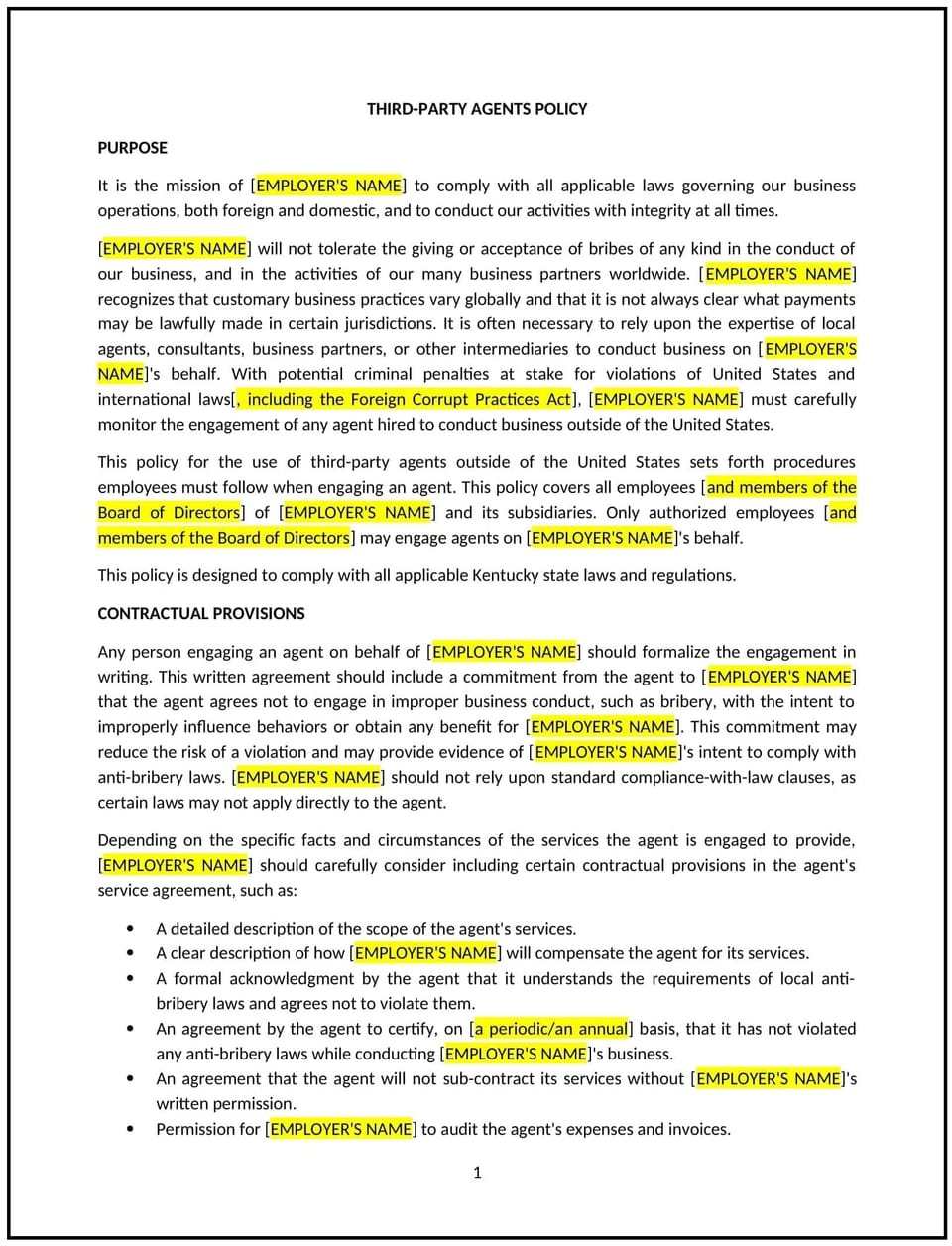Third-party agents policy (Kentucky): Free template

Third-party agents policy (Kentucky)
A third-party agents policy provides Kentucky businesses with guidelines for managing relationships with external agents, contractors, or consultants who act on behalf of the organization. This policy ensures that third-party agents operate ethically, align with business standards, and adhere to legal and regulatory requirements.
By adopting this policy, businesses can protect their interests, reduce risks, and maintain accountability in all third-party engagements.
How to use this third-party agents policy (Kentucky)
- Define third-party agents: Specify the types of external individuals or entities covered by the policy, such as contractors, consultants, or representatives acting on behalf of the business.
- Outline due diligence procedures: Require businesses to evaluate third-party agents before engagement, ensuring their qualifications, integrity, and compliance with applicable laws.
- Establish contractual requirements: Detail the terms and conditions that must be included in agreements, such as confidentiality clauses, performance expectations, and compliance obligations.
- Address ethical standards: Ensure third-party agents commit to ethical practices, including anti-bribery, anti-corruption, and conflict-of-interest policies.
- Include monitoring processes: Provide guidelines for regularly assessing the performance and conduct of third-party agents to ensure alignment with business goals.
- Specify reporting requirements: Require third-party agents to disclose any incidents, risks, or violations of the agreement or applicable laws.
- Detail consequences for non-compliance: Clarify the actions the business will take if a third-party agent fails to meet the policy’s standards, such as contract termination or legal action.
Benefits of using this third-party agents policy (Kentucky)
This policy provides several key benefits for Kentucky businesses:
- Enhances accountability: Ensures that third-party agents operate in alignment with the business’s values and standards.
- Mitigates risks: Reduces the potential for legal, financial, or reputational harm caused by third-party misconduct.
- Promotes transparency: Establishes clear expectations and reporting requirements for third-party engagements.
- Supports compliance: Helps businesses adhere to Kentucky regulations and federal laws governing third-party activities.
- Strengthens relationships: Fosters trust and collaboration with external partners by defining roles and responsibilities clearly.
Tips for using this third-party agents policy (Kentucky)
- Communicate the policy: Ensure all third-party agents are aware of the policy and its requirements during the onboarding process.
- Perform regular audits: Periodically review third-party relationships and agreements to identify and address any risks or issues.
- Train internal teams: Provide training for employees who manage third-party agents to ensure consistent application of the policy.
- Maintain detailed records: Keep comprehensive records of third-party agreements, performance evaluations, and incidents for accountability.
- Update periodically: Revise the policy as needed to reflect changes in Kentucky laws, industry standards, or business practices.
Q: Who is considered a third-party agent under this policy?
A: Third-party agents include contractors, consultants, or representatives engaged to act on behalf of the business in various capacities.
Q: What due diligence is required before hiring a third-party agent?
A: Due diligence involves evaluating the agent’s qualifications, reputation, and compliance with legal and ethical standards before engagement.
Q: What should be included in third-party contracts?
A: Contracts should include confidentiality clauses, performance expectations, compliance obligations, and consequences for non-compliance.
Q: How are third-party agents monitored?
A: Regular assessments, audits, and performance reviews are conducted to ensure third-party agents adhere to the policy and meet expectations.
Q: What happens if a third-party agent violates the policy?
A: Non-compliance may result in actions such as contract termination, legal proceedings, or other measures to address the violation.
Q: Are third-party agents required to follow ethical standards?
A: Yes, third-party agents must commit to ethical practices, including avoiding bribery, corruption, and conflicts of interest.
Q: How often should third-party relationships be reviewed?
A: Relationships should be reviewed periodically to ensure continued alignment with business goals and compliance with applicable laws.
Q: How often should the third-party agents policy be updated?
A: The policy should be updated regularly to reflect changes in Kentucky laws, industry best practices, or organizational needs.
This article contains general legal information and does not contain legal advice. Cobrief is not a law firm or a substitute for an attorney or law firm. The law is complex and changes often. For legal advice, please ask a lawyer.


